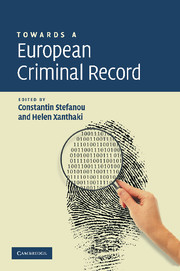Book contents
- Frontmatter
- Contents
- List of contributors
- Preface and acknowledgements
- 1 Introduction: How did the idea of a European Criminal Record come about?
- PART I
- PART II
- 5 The European Criminal Record in Austria
- 6 The European Criminal Record in the Czech Republic
- 7 The European Criminal Record in Germany
- 8 The European Criminal Record in Greece
- 9 The European Criminal Record in Hungary
- 10 The European Criminal Record in Ireland
- 11 The European Criminal Record in the Netherlands
- 12 The European Criminal Record in Slovenia
- 13 The European Criminal Record in Slovakia
- 14 The European Criminal Record in Spain
- 15 The European Criminal Record in England and Wales
- PART III
- 19 Conclusions
- Index
13 - The European Criminal Record in Slovakia
Published online by Cambridge University Press: 13 July 2009
- Frontmatter
- Contents
- List of contributors
- Preface and acknowledgements
- 1 Introduction: How did the idea of a European Criminal Record come about?
- PART I
- PART II
- 5 The European Criminal Record in Austria
- 6 The European Criminal Record in the Czech Republic
- 7 The European Criminal Record in Germany
- 8 The European Criminal Record in Greece
- 9 The European Criminal Record in Hungary
- 10 The European Criminal Record in Ireland
- 11 The European Criminal Record in the Netherlands
- 12 The European Criminal Record in Slovenia
- 13 The European Criminal Record in Slovakia
- 14 The European Criminal Record in Spain
- 15 The European Criminal Record in England and Wales
- PART III
- 19 Conclusions
- Index
Summary
General Information
The criminal record system in the Slovak Republic – national legal framework
The activity of the Register is governed by the Act on Register of Criminal Convictions that the Slovak National Council passed on 3 November 1999 and which became effective on 1 January 2000. The Act on Residence of Foreigners, as amended, was the means to introduce changes related to the protection of the state with some new penal law rules, the establishment of the National Security Authority and new powers granted to municipalities. In particular, a new provision has been introduced which allows citizens to be issued with copies from the Criminal Register. The Act on Representation of the Slovak Republic at Eurojust, as amended, regulates the relations between the Criminal Register and any Eurojust National Member when providing information from the Register.
As an EU Member State the Slovak Republic is obliged to apply decisions of EU authorities or to take the necessary implementing legislative and organisational measures on the basis of such decisions. The Council Decision on the exchange of information extracted from the criminal record (hereinafter referred to as ‘Decision’) imposes an obligation on all Member States to designate a central authority for receiving and sending information on convictions and related decisions or measures and for the mutual exchange of such information.
- Type
- Chapter
- Information
- Towards a European Criminal Record , pp. 242 - 266Publisher: Cambridge University PressPrint publication year: 2008



